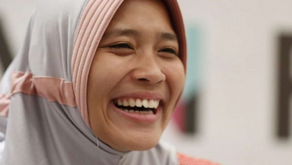My introduction on seven necessary sins for women and girls
- realshepower

- Apr 2, 2020
- 5 min read
Updated: Aug 12, 2020
The book that I have read recently is seven necessary sins for women and girls written by Mona Eltahawy. Seven sins needed for women and girls to flout, combat and upset the patriarchy are anger, attention, profanity, ambition, power, violence, and lust. The thrust of the book is that
women should give up humbleness and modesty and do not comply with patriarchy.
She calls these seven traits sins in the light of their condemnation by patriarchy. I drew some analogies between what she narrated in her book and the suffering of women and girls in my country. I also try to paraphrase her writing to improve my writing.
She broaches a subject in her book by reminiscing about her adolescence memory of sexual assault in Mecca city during the Haj pilgrimage. At that time, she felt embarrassed to react to her assaulter. Later, when she became a grown-up, she opened a hashtag referred to as #Mosquemetoo. There has been a spate of sexual attacks in the holy city of Mecca. What was seen to be out of surprise were numerous women who posted on this hashtag and shared the same story. Unfortunately, there have been many Iranian women and girls who were sexually attacked or even brutally raped during the Haj pilgrimage in the holy city of Mecca.
This terrible piece of news sparking fear has made some Iranian women prudent to travel to Mecca. What Mona wants to bring into our attention in the opening chapter is that
women must not remain silent when they are sexually molested.
They should dare to attack their attackers. Something she did later when she was in her forties and Canada. This time she punched her attacker in his face repeatedly a valiant effort that even men who witnessed believed that was a male job, not a female job. In a bar in Canada where a man touched her, other male witnesses thought that this is the responsibility of her beloved man to fight the assaulter and not her. While Mona holds firmly a belief that
women themselves should shoulder the responsibility to defend themselves and grapple their assaulters.
Unluckily, several weeks after my arrival in Canada, I was informed about a sexual assault that happened to one of my female labmates in Canada. When I was in Canada, sometimes, I received emails about the sexual attacks experienced by women in the Canadian city where I stayed. In the beginning, I was surprised. I could not even imagine that sexual violence exists in a country like Canada. But the reality is that it exists everywhere in this world. The goal of those emails sent to me and many people were raising awareness. They gave an exhaustive account of the place and time of the sexual attacks and how they happened. What was recommended was going to self-defense classes. The difference is that in my country Iran you cannot see such emails about the sexual attacks sent to many people because women feel shy to go to the police and talk about their harassment experiences. This feeling of embarrassment is something that Mona talks about at the beginning of her book. As Mona brought up in her writing, many of us may have heard, witnessed, or had first-hand knowledge of sexual assaults, which can occur in many places in churches in academic environments and so on. So many hashtags can be built to share stories.
As a person who has spent many years of her life in educational settings, I have witnessed many cases of sexual harassment. I saw several married professors who wanted to be in a relationship with many female students. They used their money, position, and power to seduce female students. There are some female students who are deceived into beginning a romantic relationship with their professors in the hope of improving their scores or even marriage. But there are found to be female students who turn down these kinds of offers. Of whom some also cannot come to terms with such disrespect and summon the courage to sue professor to the university authorities. But here the problem they may run into is Islam. In my experience, professors who sexually harassed girls in Iranian universities are religious people having connections with Iranian authorities in power. Some Muslim men subscribe to the theory that they have entitlement over women's bodies. Islam allows them to have four permanent marriages and several temporaries. Therefore they can always defend themselves by saying that they are seeking marriage as an ancestral tradition. I saw some female students suing professors sexual abuse/misconduct, ended up hearing that "it is a wrong accusation, or he made a marriage proposal." It is his fundamental right to marry!
It goes without saying that these professors and some Muslim men abuse Islam. They take advantage of the Islamic rules to harras women sexually. They abuse their power as a university professor or boss. Taking into account this position of power, some girls will not muster the courage to sue their supervisors. As Mona notifies in her book,
one reason to ask women to remain silent against sexual assaults by Muslim men is that "talking about it would make Muslims look bad, but it was the Muslim men who made Islam bad."
Mona Eltahawy speaks up about Egyptian female activists who had to give virginity tests a tool for humiliation. Iranian female activists under arrest share the same story. In Iran and some other Muslim countries, virginity for girls is of paramount importance. It is illegal for girls to lose their virginity before marriage, something which can make female activists protesting patriarchy behind the bar more vulnerable. She puts forward an argument about how the Serbian soldiers used rape as a weapon of war against Bosnian women. Rape as a weapon of war has been used against Iranian activists since the Islamic republic revolution in 1979.
There is a wrong belief strongly hold by extremist rulers of Iran that if you kill a girl while she is a virgin, she will be sent to heaven. So to prevent female political activists who were virgins from going to heaven, the Islamic republic government raped virgin girls and then executed them.
To make this rape legal, they first forced girls to marry their rapists, and then they were raped. Having executed female political prisoners also raped, the Iranian government sent the rapist to the family of the victim, as the rapist give them a box of confectioners to congratulate the family on this forced marriage and rape of their daughter. They did it to inflict more torture on families of victims. Mona considers sexual violence as an extreme manifestation of patriarchy and blaspheming against the God of patriarchy.
About the Author: Mahtab is an Iranian Social activist determined to bring a change in society. She is a strong voice for women in Iran.


























Comments